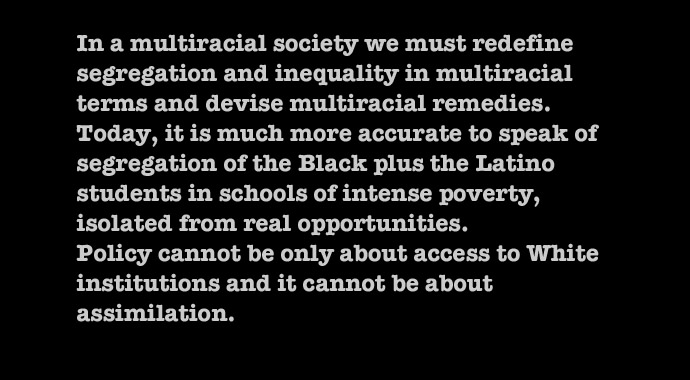Evidence Shows Brutal Impact of Racial and Economic Segregation

By John Thompson.
Most of the chapters in Learning from the Federal Market-based Reforms: Lessons for the Every Student Succeeds Act (ESSA), edited by William Mathis and Tina Trujillo, place the last 15 years of test-driven, competition-driven reforms in the context of the previous decade and a half. For instance, Ben Kirshner, Erica Van Steenis, Kristen Pozzoboni, and Matthew Gaertner, in “The Costs and Benefits of School Closure for Students,” astutely discusses school closures within the context of population shifts in cities that have created “a dynamic, ever-shifting school landscape where school closures have become normal.” The ethos of corporate school reform and a broader social and political culture where “dynamism and disruption are watchwords of a capitalist system that celebrates innovation and change,” have combined to create a mess. “For consumers wanting to get cheaper mobile phones or other consumer goods, new disruptive technologies may be desirable,” Kirchsner et. al conclude, “But when it comes to public goods, particularly in communities hard hit by disinvestment in infrastructure, jobs, or social welfare, the disruptions caused by school closures take on a dystopian quality more suited to Season Four of popular television series, The Wire…”
Personally, I learned the most from Learning from the Federal Market-based Reforms when it analyzed the impoverished, contemporary reform vision within the context of the last 50 years. “Educationalizing the Welfare State and Privatizing Education,” by Harvey Kantor and Robert Lowe, explain that until the 1960’s, the New Deal/Fair Deal quest for justice (which had its downsides, especially in terms of racial discrimination) had moved towards economic equity consistent with social democracy in Europe. The Great Society, for understandable political reasons, backed off from a social science-driven approach to the War on Poverty, starting to give into the dubious claim that education can drive economic equity, not visa versa.
The War on Poverty trade-off would have been one thing if we could have kept up the pressure for racial justice in schools and society. Desegregation produced real gains in public schools but, by the time of Reaganism, integration was seen as too much of a challenge. Since 1983, “many lawmakers have developed an unswerving faith in the power of sanctions to deter what they perceive to be unproductive behaviors by Evidence Shows Brutal Impact of Racial and Economic Segregation - Living in Dialogue:
